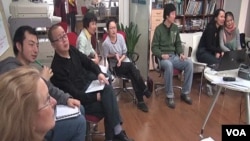BEIJING —
China's ties with Africa are growing. Media coverage generally focuses on the controversy over Beijing’s surging investment and trade, which critics say do not fairly benefit Africans. But there is a small, growing number of Chinese who are putting their careers and studies on hold to do volunteer work on the continent.
At a recent training session in Beijing, doctors, information technology specialists, business professionals and others prepare for a one- to two-year stint in Africa with international development charity VSO, Voluntary Services Overseas.
Zhang Liang, a doctor from China’s northeastern province of Liaoning, said, “A friend of mine has a clinic in Africa which was doing really well. When he returned to China and we got to know each other, he told me about his experiences there and I was very interested. I thought that if I had a chance I would least go once. It would be a privilege to try and contribute somehow."
When professionals in China volunteer, many do not know if they will get their old jobs back when they return.
But they say the opportunities abroad make it worth the risk.
Stephanie Wong, a city planner, recently returned from Zambia with VSO. She said, "I am personally very interested in working for [the] general public. Because planning is very much related to social issues, and I want to experience myself what I can do for the general public as a planner."
While China may be the world’s second largest economy, it still has more than 200 million people living off of less than a dollar and 25 cents a day.
VSO country director Fanny Chan said that gives Chinese volunteers a unique perspective.
"When we talk to the volunteers from China most of them, either through their families or even themselves, have witnessed poverty," said Chan. "And they also know that if people have better access to basic services, to education, can find a way to make a living that can lift people out of poverty. They know that is possible."
China has been sending medical volunteers to Africa for decades. They are now in 45 countries on the continent. China’s youth volunteers corps, an effort similar to the United States’ Peace Corps, is a path that some choose.
But, said Liu Haifang, deputy director of Peking University’s Africa Research Center, students are increasingly turning to other organizations for overseas volunteer work.
"My impression is that young volunteers are finding their own ways to go abroad. They are not inclined to say that they represent China," Liu said. "They are not interested in saying who they represent. They represent themselves. They have ambitions and dreams that they want to realize."
Liu said the trend highlights the changes in how China and its citizens are reaching out to the rest of the world.
At a recent training session in Beijing, doctors, information technology specialists, business professionals and others prepare for a one- to two-year stint in Africa with international development charity VSO, Voluntary Services Overseas.
Zhang Liang, a doctor from China’s northeastern province of Liaoning, said, “A friend of mine has a clinic in Africa which was doing really well. When he returned to China and we got to know each other, he told me about his experiences there and I was very interested. I thought that if I had a chance I would least go once. It would be a privilege to try and contribute somehow."
When professionals in China volunteer, many do not know if they will get their old jobs back when they return.
But they say the opportunities abroad make it worth the risk.
Stephanie Wong, a city planner, recently returned from Zambia with VSO. She said, "I am personally very interested in working for [the] general public. Because planning is very much related to social issues, and I want to experience myself what I can do for the general public as a planner."
While China may be the world’s second largest economy, it still has more than 200 million people living off of less than a dollar and 25 cents a day.
VSO country director Fanny Chan said that gives Chinese volunteers a unique perspective.
"When we talk to the volunteers from China most of them, either through their families or even themselves, have witnessed poverty," said Chan. "And they also know that if people have better access to basic services, to education, can find a way to make a living that can lift people out of poverty. They know that is possible."
China has been sending medical volunteers to Africa for decades. They are now in 45 countries on the continent. China’s youth volunteers corps, an effort similar to the United States’ Peace Corps, is a path that some choose.
But, said Liu Haifang, deputy director of Peking University’s Africa Research Center, students are increasingly turning to other organizations for overseas volunteer work.
"My impression is that young volunteers are finding their own ways to go abroad. They are not inclined to say that they represent China," Liu said. "They are not interested in saying who they represent. They represent themselves. They have ambitions and dreams that they want to realize."
Liu said the trend highlights the changes in how China and its citizens are reaching out to the rest of the world.






